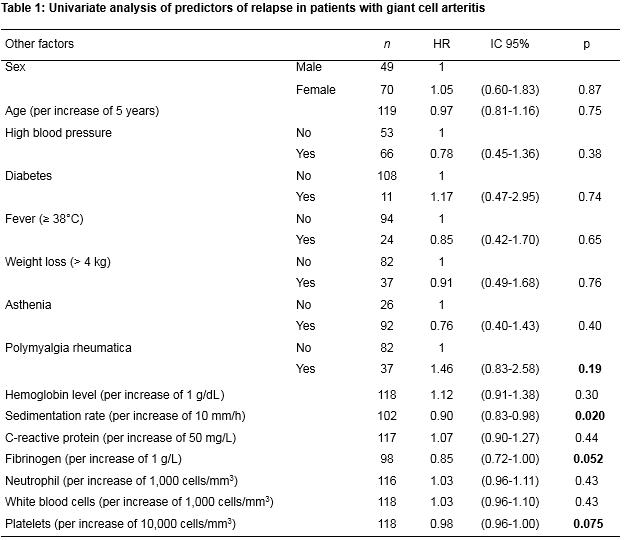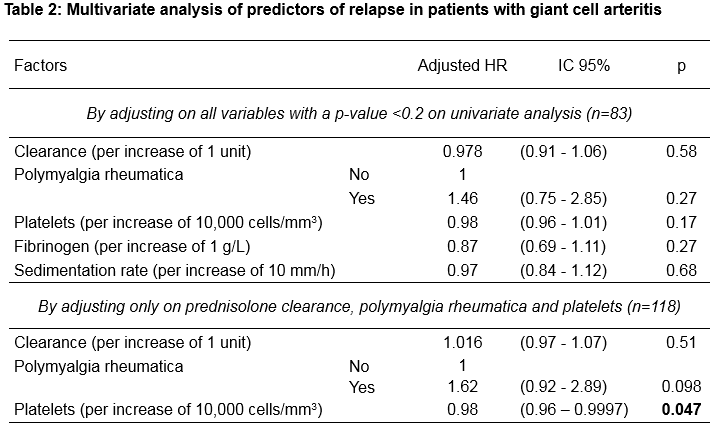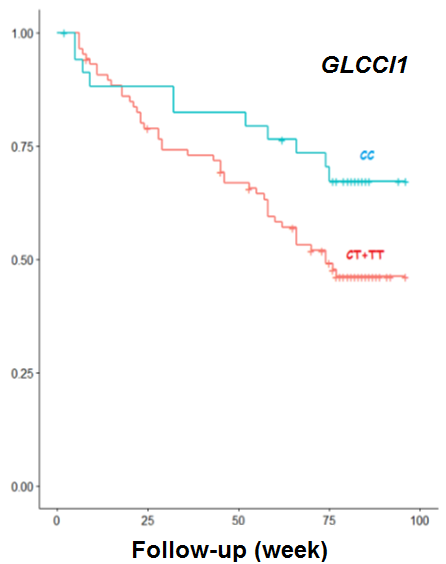Session Information
Session Type: Late-Breaking Abstract Poster Session
Session Time: 9:00AM-11:00AM
Background/Purpose: Giant cell arteritis (GCA) is the most common cause of primary vasculitis in adults. Corticosteroids are the cornerstone of the treatment. However, approximately 50% of patients will relapse, and up to 86% will experience steroid-induced adverse events. The objective was to study the risk factors for relapse, including prednisolone clearance and glucocorticoid-induced transcript 1 (GLCCI1) promoter polymorphism (rs37972), which acts on steroid-induced apoptosis.
Methods: This multicenter prospective study included steroid-naive patients with a diagnosis of GCA, defined by ≥3/5 American College of Rheumatology (ACR) criteria (trial registration: NCT01400464). Patients received steroids, with a 10 to 16 months predefined taper schedule, with a planned follow-up of 18 months after inclusion. Genotyping of GLCCI1 (rs37972) and prednisolone clearance were performed between 14 and 28 days of treatment. Variables with p< 0.20 on univariate analysis were considered for multivariate analysis. Relapse was defined as the combination of inflammatory syndrome (C-reactive protein >15 mg/L or sedimentation rate >40 mm/h), GCA symptoms and resolution with increasing the dose of prednisone. The primary objective was the link between the prednisolone clearance and the risk of relapse.
Results: A total of 139 patients were included, but 20 were excluded from analysis (missing prednisolone clearance, n=18; cortico-resistant, n=2). Among the 119 patients (70 women), the mean age was 72.2 +/- 7.6 years with a median follow-up duration of 74 [32-82] months. Thirty-seven (31%) had polymyalgia rheumatica, the median C-reactive protein level and sedimentation rate were 78 [13-102] mg/L and 70 [35-94] mm/h, respectively, and 59 (49.6%) patients had at least one relapse. The mean prednisolone clearance was 7.2 +/- 6.7 L/h. For each increase of 1 unit of clearance, the relapse risk increased, although not significantly, by 2.6% (hazard-ratio, HR=1.026, IC95% 0.99-1.06) in univariate analysis. On multivariate analysis, only platelets were associated with a decreased risk of relapse (HR=0.98, IC95% 0.96-0.9997, for each increase of 10,000 platelets/mm3, Tables 1 and 2).
Additionally, based on an ancillary study among 121 patients who had a determination of GLCCl1 rs37972 polymorphism, patients with a CC genotype experienced fewer relapses than patients with at least one T allele (Figure 1) in multivariate analysis adjusted for polymyalgia rheumatica (HR=0.498, IC95% 0.26-0.97, p=0.04).
Conclusion: To our knowledge, this study is the largest prospective study including steroid-naive GCA patients treated with uniform predefined taper schedule, and the first one assessing prednisolone clearance as a risk factor for relapse.
On multivariate analysis, a higher platelet count and a CC rs37972 polymorphism were associated with a decreased risk of relapse.
Further studies are needed to determine the effect of a steroid-sparing treatment as a first-line treatment in association with steroids in patients with the CT or TT rs37972 polymorphism.
To cite this abstract in AMA style:
Deshayes S, Bourdin V, Creveuil C, Boutemy J, Liozon E, Kyndt X, Sailler L, Pugnet G, de Boysson H, Hachulla E, André M, Magnant J, Boddaert J, Fain O, Mékinian A, Hamidou M, Guillevin L, Landron C, Marie I, Chène Y, Becquemont L, Verstuyft C, Bienvenu B. GLCCI1 Polymorphism Is Associated with Prednisone Response in Giant Cell Arteritis: A Multicenter Prospective Study [abstract]. Arthritis Rheumatol. 2019; 71 (suppl 10). https://acrabstracts.org/abstract/glcci1-polymorphism-is-associated-with-prednisone-response-in-giant-cell-arteritis-a-multicenter-prospective-study/. Accessed .« Back to 2019 ACR/ARP Annual Meeting
ACR Meeting Abstracts - https://acrabstracts.org/abstract/glcci1-polymorphism-is-associated-with-prednisone-response-in-giant-cell-arteritis-a-multicenter-prospective-study/



